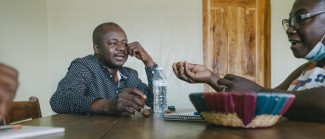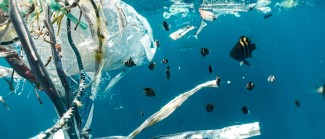Bihaicha is not afraid of hard work.
By day, the thirtysomething is the co-owner of a dairy farm in Comoros, by night, she dabs into spice trade. With two associates, she founded the Natura farm in the highlands of la Grande Comore, the main island of the Comoros archipelago.
Ever since she was a little girl, she wanted to own farming business. This dream has driven her to pursue her passion despite the many roadblocks to starting a business.
The lay of the land
It takes good tires and an intrepid spirit to access the dairy farm. The farm sits on a rocky plot of land typical to Comoros' volcanic landscape, an hour outside of Moroni, the capital. The road leading to the farm has been cleared but it is betrayed by the rough terrain of black boulders.
The farm consists of three simple buildings, all of them holding the promise of a successful dairy business. One is the processing unit that will soon transform milk into silky yoghurt or fatty butter. The other two contain their most precious asset: cattle.
The farm currently has 6 cows, 2 calves and a bull. It produces small quantities of milk that are sold to customers from the area. Since starting their project in 2019, the three young business partners faced a number of struggles. Between COVID-19, bovine diseases, a delayed milk production and the loss of a bull, their persevered through.
"Even if it is hard, I love what I do, so I don't see why I would change anything," says Bihaicha. "I know that if I gave up now, I would always go back to this dream".
New entrepreneurs notorious face a few difficult years at the beginning of their business. When even the land itself sometimes feels like it is set against them, where can they find support during these challenging first years?
A lending hand
This is a question on which the Executive Director of the Mutuelle d'épargne et de crédit ya Komor - Moroni (MECK – Moroni), Laila Said Hassane, has been reflecting. She heads a micro-finance institution in Comoros that promotes sustainable and accessible financial services, particularly for women and young people.
"In recent years, we grew frustrated with the lack of visible impact of the micro-financing MECK was providing," says Said Hassane. "We decided to set up a special support programme for young entrepreneurs." The programme specifically focused on rearing agro-processing businesses like Natura Farm.
This is how Bihaicha and her associates came to benefit from this programme. With diplomas in crop technology, livestock farming and management, they are a multidisciplinary trio and came with a solid business plan.
They received €120,000 in loans to start their business, €10,000 of which they used to buy the land that the farm sits on. €80,000 was used to import cattle from mainland Africa, buy equipment and finance the construction of the farm's main buildings.
The Enhanced Integrated Framework provided a €30,000 security to MECK-Moroni to shoulder the risk of the investment. This sort of blended finance is catalytic for aspiring business owners like Bihaicha. Blended finance is a way to use public funds to increase private investment in sustainable development.
Becoming a landowner, commissioning the construction of buildings, transporting livestock across borders. All this is necessary to get the business off the ground, but it takes capital. The trio would not have been able to set up their business on their own given the amount of liquidity required.
The MECK-Moroni also uses an Islamic finance model which means that repayment of the loan only starts after the company has started production.
This has proven vital during a period like the pandemic when they were not able to import cows from Kenya because of closed borders. Instead, the young entrepreneurs focused on erecting the different buildings that their business needed, like an enclosure for the cows or a room where to put the processing equipment.
Breathing room for success
Access to finance is the most often cited barrier that entrepreneurs face. Having access to seed financing or financing to scale up a business is critical in spearheading the growth of a small business.
Knowing that they are backed by solid financing allows young entrepreneurs to cope with the minor setbacks that inevitably arise with starting a new business and gives them the breathing room to persevere.
For micro-lending institutions like the MECK-Moroni, blended finance allows them to not shoulder the risk of investment alone and gives them the opportunity to invest in ambitious entrepreneurs.
Bihaicha is not afraid of hard work. This support has emboldened her dream to live off a farming business. She has all kinds of plans. She has started to look into installing beehives on her land and planting attractive flowers to tease delicious honey out of the bees.
"In the next five years, the plan is to start transforming milk into dairy products," says Bihaicha. "We have this idea to mobilize the neighbouring dairy producers into a cooperative so that they can sell us their milk and we transform it."
Exploiting the local market is exactly the idea Said Hassane had in mind when developing this program: "There is more demand for local products, such as milk, than the supply allows. And unfortunately, the national market is flooded with imports such that it has a negative impact on food security and entrepreneurship."
New businesses need credit under the best conditions, they need to be supported by encouraging financial institutions that have economic, but also social and development considerations in mind.
"Here at MECK-Moroni, we are motivated by development," says Said Hassane, "we want to support locals"
This is just the type of help that hardworking young people needs to kickstart their dreams, wean themselves from foreign imports and celebrate the trade potential of land where, with a little support, milk and honey can flow…
If you would like to reuse any material published here, please let us know by sending an email to EIF Communications: eifcommunications@wto.org.



